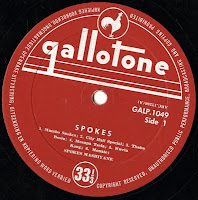The insidious impact of mass media in shaping our identities and preferences goes way back and more than skin deep! Take this 78rpm South African Jazz record from 1956, singing the praises of skin lighteners and Vaseline. “Who’s that girl” … “the best looking girl I ever did see” performed by the "Basin Tone Drifters" and sung in the style of the Manhattan Brothers in English and Zulu extols the virtues of Pond’s Vanishing Cream and Blue Seal Vaseline.
A further twist in this fascinating early advertising tale is that the composer is registered under the pseudonym “Mafutha Amahlope” – literally meaning “Fat Whitey”. At least the real author Christoffel Nicolaas Du Toit had some sense of humour? The U.S. Library of Congress Catalogue of Published Music also records that Melody Music of Johannesburg registered these two songs on 1st October 1956.
South Africa’s first commercial radio station, Springbok Radio, was launched on 1st May 1950. African language broadcasts to the metropolitan areas began in 1953. We wonder if these recordings were paid-for advertising jingles or passed off as kwela jive harmony hits? There can be no doubt though, this record must be amongst the first examples of purpose-made music/advertising aimed at South Africa's black consumers.
Despite being banned in South Africa in 1986, skin lighteners are still used, and the broader debates around skin lightening, identity, beauty and aspirations continue. Going by a recent article in the Sowetan, these debates are changing though.
“More than ever South Africans are realising that black is beautiful. As a nation we have overcome the baasskap mentality that suggests that anything dark is ugly and therefore undesirable.
“Politically we are maturing and we are taking pride in who we are. This is filtering through to the modeling industry and the media,” Mazibuko says.
Mazibuko observes that the curse of the darker skinned woman was broken by African model Alek Wek, (right) a Sudanese refugee who made her US modelling debut a few years ago. She has since become one of the most sought-after models in the business.
In addition to her magazine covers, Wek has modelled for scores of top designers, walked in major fashion shows all over Europe and the US opening shows for huge names such as Ralph Lauren.
Mazibuko adds that the Africanist ideals of people such as Thabo Mbeki and former Ghanaian president Kwame Nkrumah have influenced the way a lot of Black South Africans think about themselves.
“We are beginning to appreciate our sisters who are as dark as the night, with short natural hair and prominent and fabulously full lips.”
More on the science and sociology of skin lightening here.

RS here
MF here























